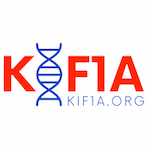KIF1A Day Date in the current year: April 28, 2026
 KIF1A Day is held every year on April 28 to raise awareness of KIF1A-associated neurological disorder (KAND), an extremely rare genetic disease caused by a mutation in the K1F1A gene.
KIF1A Day is held every year on April 28 to raise awareness of KIF1A-associated neurological disorder (KAND), an extremely rare genetic disease caused by a mutation in the K1F1A gene.KIF1A is a type of motor protein found in human cells, particularly neurons. Its main job is to transport nutrients and other important molecules, along long fibers called microtubules, which act like highways inside the cell. This transport is critical for keeping neurons healthy and for communication between different parts of the nervous system. KIF1A is sometimes called a “molecular marathon runner” because of its ability to transport molecules at very long distances at very high speeds.
The KIF1A gene is responsible for producing the KIF1A protein. A mutation in this gene can affect the production of KIF1A and result in a variety of neurological symptoms related to balance, coordination, muscle strength, and reflexes that can vary in severity depending on the exact mutation. The disease caused by pathogenic mutations in the KIF1A gene is called KIF1A-associated neurological disorder (KAND).
The symptoms of KAND can vary greatly from patient to patient; the disease does not affect any two patients in the same way However, there are some common symptoms associated with the disorder, such as:
- Hypotonia (abnormally low muscle tone) or hypertonia (abnormally increased muscle tone)
- Peripheral neuropathy (damage to peripheral nerves causing tingling, numbness, tremors, cramps, shooting or burning pain)
- Hereditary spastic paraplegia (gait abnormalities)
- Ataxia (poor muscle coordination and balance)
- Flat feet
- Various types of seizures/epilepsy
- Developmental delay/intellectual disability
- ADHD
- Autism
- Anxiety
- Gastrointestinal problems (GERD, constipation, diarrhea)
- Vision problems
- Body temperature regulation problems
- Reduced sensitivity to pain
- Cerebral atrophy (loss of nerve cells and connections between them)
It should be noted that an affected individual may experience some of these symptoms, but not all of them (in fact, some symptoms are mutually exclusive, such as hypotonia and hypertonia). KAND is often misdiagnosed because it is very rare (as of 2025, it has been diagnosed in about 500 people worldwide) and easily confused with more common conditions such as cerebral palsy. The diagnosis can only be confirmed by genetic testing. Due to the overlap in symptoms between KAND and more common conditions, it is believed that most KAND patients are misdiagnosed or undiagnosed.
KAND is a progressive disorder, meaning that it progresses over time, but the symptoms, their severity and progression vary from patient to patient. There is no cure or even treatment for the disorder, so management focuses on alleviating specific symptoms.
KIF1A Day was created by KIF1A.ORG, a patient-focused foundation dedicated to supporting patients with KAND and their families and advancing research to find a cure. You can get involved by learning more about the disease and sharing what you’ve learned with others, donating to KIF1A.ORG, and spreading the word on social media using the hashtag #KIF1ADay.
- Category
- International Observances
- Tags
- KIF1A Day, international observances, awareness days, KIF1A-associated neurological disorder, KAND